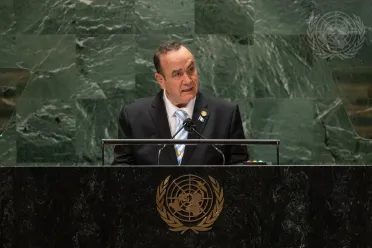Statement
Statement summary
ALEJANDRO GIAMMATTEI FALLA, President of Guatemala, stressed the need to immunize a critical mass of the world population against COVID-19, an effort that will require equitable access to the vaccine. The hoarding of vaccines by wealthier countries could result in increased risk for those very countries, he warned. Despite the daunting challenges, the pandemic highlighted the enormous capacity of humanity for resilience, he said.
In Guatemala, the Government continues efforts aimed at comprehensive development, including social programmes that protect life from conception through old age. As for the conservation of its environment, he pointed out that Guatemala experiences the greatest risk of climate change and highlighted efforts to rehabilitate infrastructure and agriculture systems in the wake of damaging hurricanes. In addition, it has been impacted by a constant increase in the price of fuel. In response, the country promotes the use of natural energy resources to reduce its dependency on imported fuel. The pandemic led to not only human loss but compromised food systems in Guatemala, he went on, outlining a national crusade for nutrition that includes programmes to support families with vegetable gardens and school farming.
Turning to the migration crisis, he called for the building of a “wall of prosperity”, so people have a desire to stay in their home countries. For its part, Guatemala has a stable economy with growth exceeding 4 per cent, making it a destination country for international investment, he said. The Government will continue to work to increase revenue and promote small Guatemalan businesses. However, the region continues to suffer from the scourge of drug trafficking which monopolizes resources that should be used for development. The demand exists for its consumers, especially in the United States, he stressed. Guatemala is working to fight the drug trade and successfully broke up 15 trafficking rings and destroyed thousands of cocaine, poppy and marijuana plants. Additionally, his country achieved a noteworthy reduction in maritime trafficking. Unfortunately, those successes don’t seem to be valued by the consuming countries, which bear the most responsibility. As such, he demanded support from international partners for more to be done to repatriate funds that leave Guatemala because of drug trafficking.
Guatemala must be recognized as a vulnerable region in terms of climate change and natural hazards, he went on, requesting the granting of secure parameters that will allow countries to rebuild infrastructure after such events. That will require an agreement from industrialized countries who are primarily responsible for climate change. For instance, the disastrous effects of climate change on Guatemala’s forests could be mitigated with contributions from industrialized States, he stressed.
As for the Security Council, it must be more objective and equitable, he said, and as a troop-contributing country, he called on the Council to be more consistent with its responsibility and role, particularly as it pertains to the veto. In closing, he stressed that assistance and cooperation between nations should never put self-determination or sovereignty at risk.
Full statement
Read the full statement, in PDF format.
Photo

Previous sessions
Access the statements from previous sessions.
